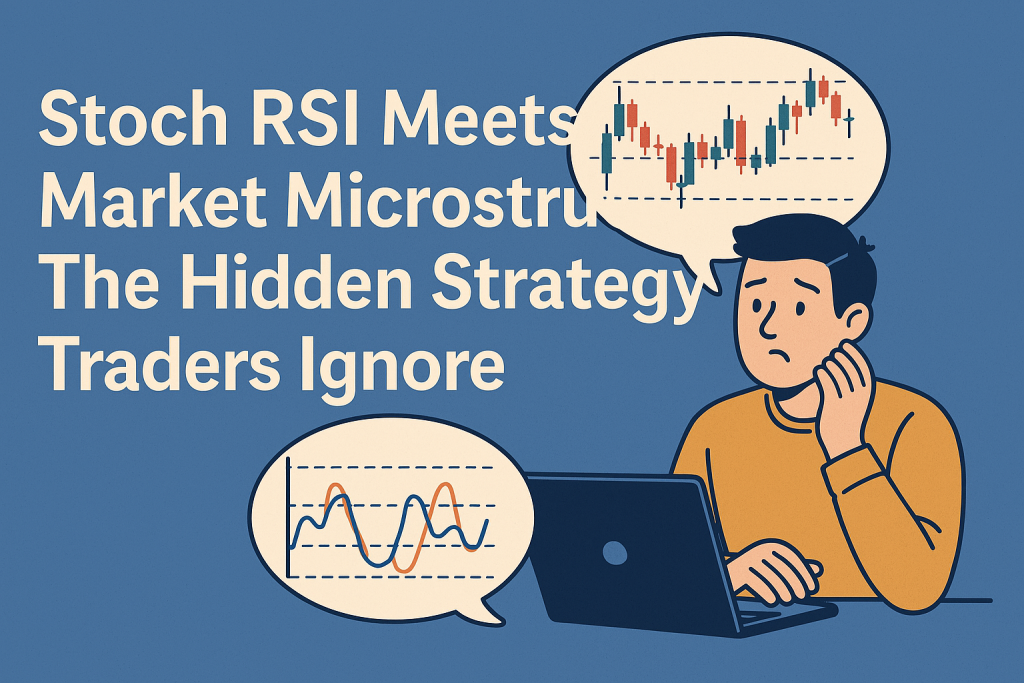The Secret Weapon in Market Microstructure: Why Stoch RSI Isn’t Just a Fancy Oscillator

If you think Stoch RSI is just another shiny toy in your trading toolbox, prepare to have your Forex worldview rocked harder than a GBP/USD spike on NFP day. Hidden beneath its deceptively simple surface lies a data-driven ninja blade — a scalpel for slicing through the thick fog of market microstructure. But here’s where it gets real spicy: when used correctly, Stoch RSI doesn’t just show momentum—it exposes the psychology of liquidity providers and reveals the rhythm of price manipulation like a backstage pass to the Forex circus.
And that’s not just hype. It’s a hidden edge.
How Most Traders Misuse Stoch RSI (And What It Actually Shows)
Most traders treat Stoch RSI like it’s the knockoff version of the original RSI: same soul, cheaper clothes. They look for overbought and oversold signals and hope for divine price reversals. That’s like ordering a protein shake and expecting a six-pack by Friday.
Let’s break the myth:
- Stoch RSI is the RSI of RSI. Yes, it’s that meta.
- It magnifies short-term momentum changes — not price.
- It’s a volatility-sensitive mood ring for crowd behavior.
Where Market Microstructure Meets Momentum
Now, let’s spice things up: market microstructure is the “quantum physics” of trading. It’s the study of how orders interact at the bid/ask level. Think order flow, liquidity traps, spoofing, slippage, spreads — the shadowy backstage of price formation.
So what happens when you drop a finely tuned sentiment gauge like Stoch RSI into this chaos?
Magic.
Stoch RSI, when aligned with microstructural shifts, acts like a sonar ping in a murky ocean of limit orders. It detects:
- Liquidity Imbalances: Watch for sharp Stoch RSI reversals when price stalls near support/resistance. This often reveals exhausted liquidity pockets.
- Fakeouts & Traps: Combined with tape reading, a sharp spike in Stoch RSI with no price follow-through often signals a liquidity hunt.
- Stop Runs: You’ll often see aggressive Stoch RSI divergences right before a major stop loss sweep.
The Weird (But Profitable) Setup: Double-Divergence with Order Flow Twist
Here’s a game-changer for scalpers and short-term swing traders:
- Identify a clear support or resistance zone (preferably within a range).
- Look for a Stoch RSI divergence on two timeframes (e.g., 5-min and 15-min).
- Use your order flow tool (like DOM or footprint chart) to confirm trapped traders or spoofing activity.
- Pull the trigger right before price fakes out.
Bonus Tip: Filter with VWAP deviation. If price is hugging VWAP and Stoch RSI screams “oversold” while order book shows aggressive absorption—you’re in sniper territory.
Expert Take: What the Pros Say
According to Linda Raschke, legendary trader and market structure expert:
“Oscillators, when used with an understanding of crowd behavior and liquidity flows, become predictive tools.”
And Mike Bellafiore of SMB Capital:
“Market structure gives you the context. The indicator just tells you when the big boys are ready to pull the trigger.”
Stoch RSI is that whisper before the sniper shot — if you know what to listen for.
Hidden Opportunities in Consolidation Zones
Sideways market? Most traders yawn. Smart traders hunt. In tight consolidations, the Stoch RSI behaves like a caffeine-crazed squirrel, flipping between extremes. That’s a tell.
Why?
- Low Liquidity = Easy Manipulation
- Stoch RSI extremes = Algo bait
Watch for price to “stall” as Stoch RSI hits extremes. That’s often where algorithms trigger fake breakouts.
Insider Tactic:
- Mark previous high/low range.
- Wait for Stoch RSI to peak at range edge.
- Confirm with footprint delta flip.
- Ride the breakout against the crowd.
The Untold Risk: When NOT to Use It
Yes, it’s powerful. But use it wrong, and you’ll feel like a magician pulling a rabbit out of a hat… and it bites your hand.
Avoid using Stoch RSI:
- During high-volatility news releases (like NFP or CPI). Microstructure is chaos; oscillators lie.
- On illiquid pairs or off-hours — too noisy.
- Without microstructure context. It’s not a crystal ball; it’s a seismograph.
Real-World Case Study: EUR/USD Flash Trap
January 2025. ECB announcement incoming. EUR/USD coils tighter than a trader before margin call. Stoch RSI hits 0.01 on 15-min and 1-min timeframes.
Price fakes a downside breakout.
- Retail piles in short.
- Order flow shows massive bid absorption.
- Boom. Whipsaw to the upside.
Lesson? The divergence was a trap. Smart money was absorbing sell orders. Stoch RSI showed the stress fracture before it cracked.
Final Thoughts: Why This Matters More Than Ever
In today’s algo-dominated world, reading raw price action isn’t enough. You need tools that translate chaos into clarity.
Stoch RSI + market microstructure = signal in noise.
It gives you x-ray vision into the emotional pulse of the market and the strategic moves of institutional players.
Elite Takeaways: What You Now Know
- Stoch RSI isn’t just an oscillator. It’s a momentum microscope.
- When paired with microstructure, it reveals hidden liquidity traps.
- Divergences are strongest when they align across timeframes and order flow.
- Best used in consolidations, range edges, and low-liquidity zones.
- Avoid using during major news or on low-volume pairs.
Want More Insider Tactics?
- Get daily Forex news with market-moving insights: Forex News Today
- Master advanced strategies with our Free Forex Courses
- Join the elite at StarseedFX Community
- Build your personalized Trading Plan
- Upgrade your execution with Smart Trading Tools
—————–
Image Credits: Cover image at the top is AI-generated
PLEASE NOTE: This is not trading advice. It is educational content. Markets are influenced by numerous factors, and their reactions can vary each time.

Anne Durrell & Mo
About the Author
Anne Durrell (aka Anne Abouzeid), a former teacher, has a unique talent for transforming complex Forex concepts into something easy, accessible, and even fun. With a blend of humor and in-depth market insight, Anne makes learning about Forex both enlightening and entertaining. She began her trading journey alongside her husband, Mohamed Abouzeid, and they have now been trading full-time for over 12 years.
Anne loves writing and sharing her expertise. For those new to trading, she provides a variety of free forex courses on StarseedFX. If you enjoy the content and want to support her work, consider joining The StarseedFX Community, where you will get daily market insights and trading alerts.
Share This Articles
Recent Articles
The GBP/NZD Magic Trick: How Genetic Algorithms Can Transform Your Forex Strategy
The British Pound-New Zealand Dollar: Genetic Algorithms and the Hidden Forces Shaping Currency Pairs
Chande Momentum Oscillator Hack for AUD/JPY
The Forgotten Momentum Trick That’s Quietly Dominating AUD/JPY Why Most Traders Miss the Signal
Bearish Market Hack HFT Firms Hope You’ll Never Learn
The One Bearish Market Hack High Frequency Traders Don't Want You to Know The

